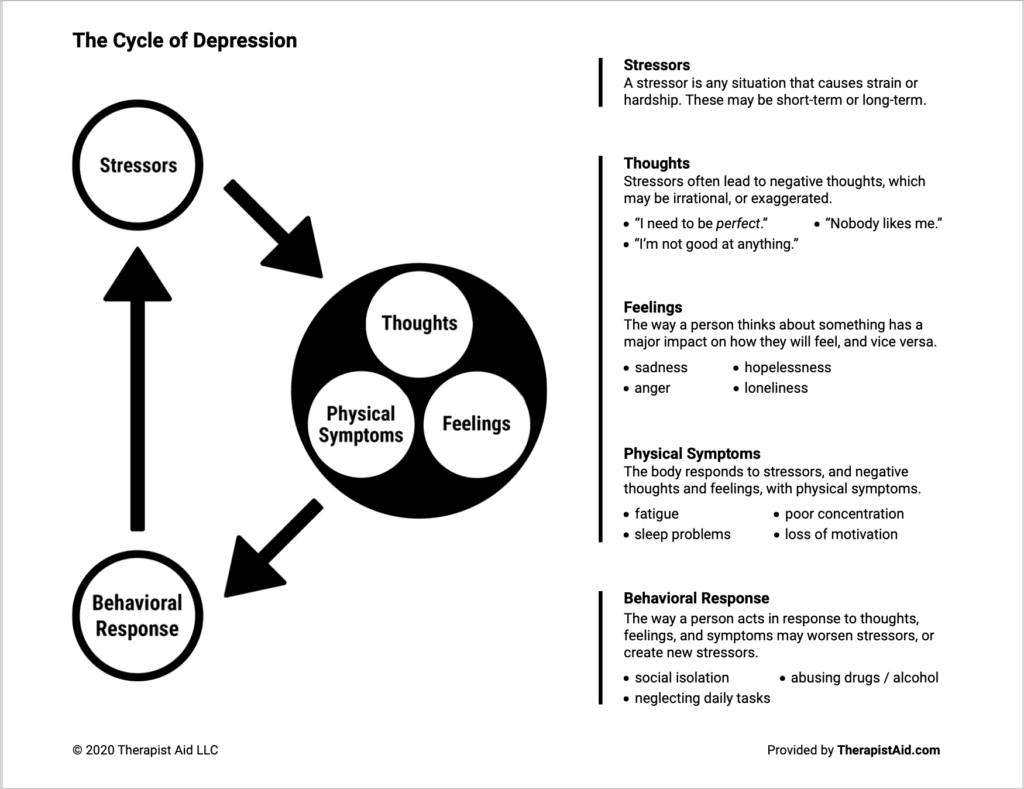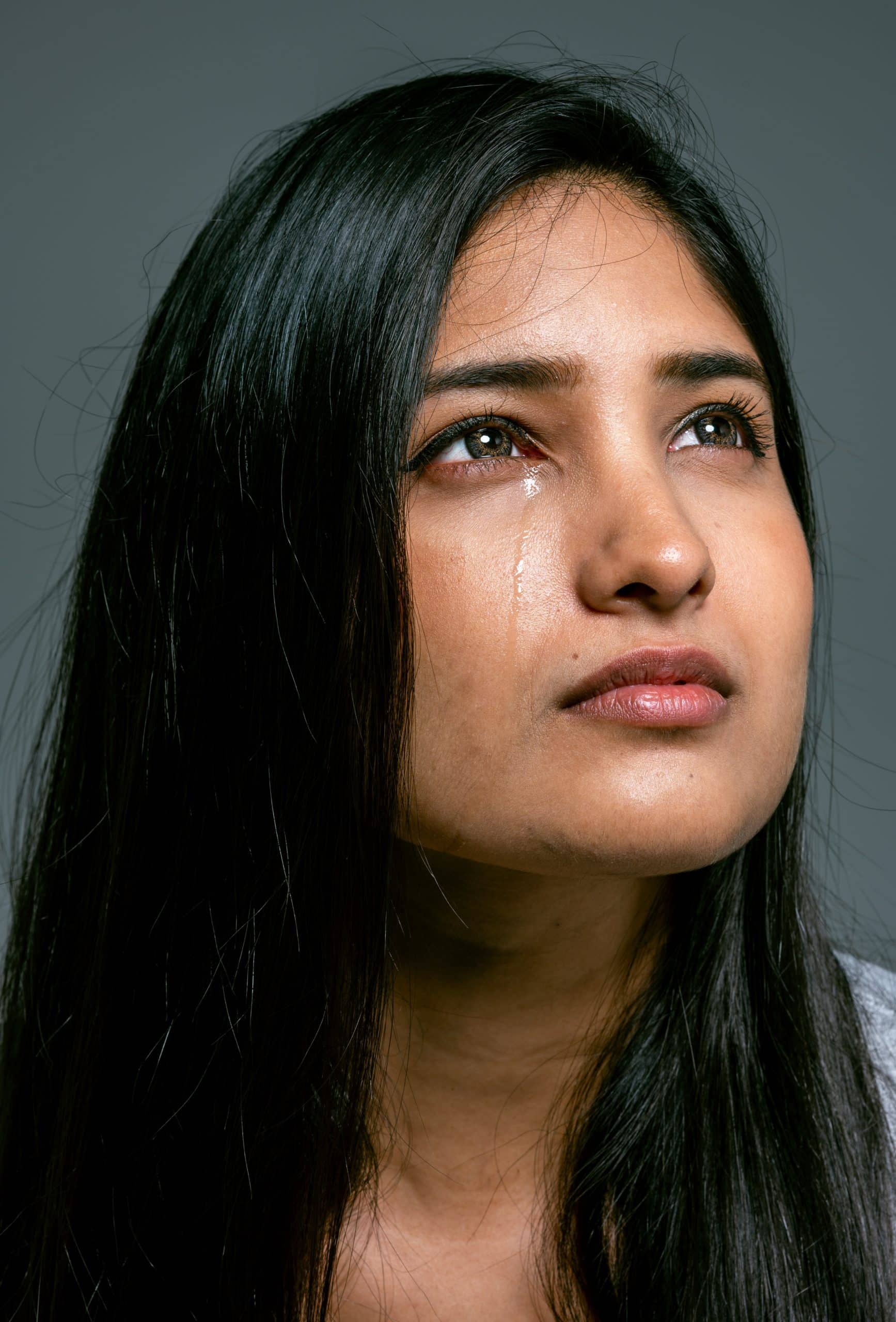Why Am I Crying for No Reason: How to Tell If It’s a Sign of Depression or Anxiety

I have been crying for weeks at a time with no specific cause, I do not feel happy, and I do not feel good about myself. If this sounds like you, this article should help answer many of your questions!
Crying for no reason is one of the most common signs of depression. But you don’t have to feel depressed to cry for no reason or feel like you are crying for no reason. Sometimes, a person might have cause to be crying but no feelings behind their tears.
You are not alone, as this is a common issue for moms postpartum, grieving individuals, and those who feel hopeless, overwhelmed, or discouraged about their life.
Crying is a form of release due to sleep deprivation, hormonal imbalance, nutrient deficiency, trauma, stress or burnout, and fatigue.
If you are crying most days for an extended time and your question, why am I crying for no reason, we will cover this from a mental health perspective.
Table of Contents
Why am I crying for no reason?
Research shows that feelings of depression and anxiety can cause crying. Oftentimes the body remembers what the brain may try to forget or not actively think about.
1. Anxiety
Anxiety can be caused by feeling overwhelmed, rushed or a number of other reasons.
Common Symptoms of Anxiety
- Irritability
- Racing thoughts
- Heart racing
- Crying
- Sweating
- Body tension
- Headaches
- Shortness of breath
- Avoidance of situations
- Anger
2. Depression
Depression can be a result of feeling overwhelmed as well. Feeling overwhelmed by negative thoughts about yourself, others and the world around you. However, this can cause you to shut down and result to being in a more withdrawn, dorsal vagal shutdown state.
Common Symptoms of Depression
- Rumination
- Negative thoughts
- Crying
- Irritability
- Low mood
- Low energy
- Lack of motivation
- Fatigue
- Poor Concentration

Other Reasons for Crying
You may also be crying because of low self-esteem, social anxiety, fears, pain, physical soreness, feeling like you don’t know what you want, and feelings of abandonment.
Medication-Free Ways to Cope with Anxiety and Depression
Medication only takes you so far when lifestyle and thought processes contribute to depression.
Therapy, finding local support groups, exercising, treating poor gut health, setting boundaries, learning mindfulness, and starting a gratitude list are all excellent ways to treat anxiety and depression. I highly recommend these to my clients and have proven to be effective with depression and anxiety.
Using a gratitude journal can help your brain see everything working in your favor despite believing you may not have enough. This is not simply to say you are only ungrateful; this is proven to be a very effective way of improving mood and overall satisfaction.
A great way to keep track of what you are thankful for and focus on all the good you have in your life.
3. Trauma
Trauma is another reason to question, “why am I crying for no reason?” A crisis is an event that may cause an individual to experience traumatic symptoms. Such as abuse, a car accident, death, near-death experience, serious physical injury, bullying, natural disaster, and more.
Traumatic events can cause posttraumatic stress disorder or manifest as depression and anxiety.
Trauma Symptoms
- Flashbacks
- Nightmares
- Knee-jerk reactions to certain sounds, sights, and feelings
- Memory problems
- Fear of men or women
- Feelings of inferiority
- Trouble breathing
- Feeling tense all of the time
- Waking up early in the morning and having a hard time going back to sleep
- Other trauma symptoms
These are just some symptoms of trauma; however, having these symptoms does NOT mean you are still traumatized. Working with a therapist and your physician is essential to help you navigate your symptoms effectively.
Thankfully there is evidence that survivors of even the most traumatic experiences, including veterans who were kidnapped and tortured, were able to develop posttraumatic growth.
Forgiveness therapy is a very effective treatment that may be challenging but helps separate you from the wrongdoing committed against you.
4. Why am I crying for no reason after giving birth?

Childbirth can be a beautiful and exhausting experience. Endocrine disruption after childbirth is correlated to mental health issues, including postpartum depression. Hormones during pregnancy increase greatly to help with a baby’s growth and in preparation for making contractions to induce labor.
A dramatic drop in progesterone is responsible for an increased risk of postpartum depression. Progesterone is a hormone that calms the mind and body, reduces cell proliferation, and alleviates typical period symptoms such as cramps and hot flashes.
Progesterone’s metabolite, allopregnanolone, decrease irritability, and progesterone will deplete after birth and will not produce again until the next menstrual cycle.
Estradiol, the dominant estrogen produced, is suppressed postpartum, and therefore its depression-fighting and serotonin-producing abilities are decreased due to the body’s need to lactate.
Furthermore, there are increased levels of cortisol postpartum.
Postpartum Depression Prevention
This is not a foolproof method; you should always check with your doctor and get your blood work done to assess your personal needs. Now let’s get into preventative measures we can take!
- Take progesterone and estrogen supplements postpartum.
- Track your hormone levels at home (this is a drug-free birth control method as well)
- Get Bloodwork done to test your hormones and know precisely where your concern is
- Take supplements to increase hormonal balance, such as adaptogenic herbs, vitamins, and minerals that can also reduce stress.
- Find a support system—friends, family, a local church, charity, spouse, neighbors, etc. Lean on them as often as you can.
- Exercise during pregnancy can help with faster recovery and elevated mood.
5. Crying on your period
PMS symptoms increase during the luteal phase of your period. Physical symptoms of PMS include bloating, fatigue, and cramping. While psychological symptoms could be anxiety, depression, sadness, irritability and result in crying.
Anger is a protective emotion which may be displayed when you feel anxious, sad, depressed, annoyed, irritable, tired, hungry, etc.
In a research study women had a decreased ability to control anger during PMS.
Furthermore, sex hormone fluctuations and increased cortisol levels contribute to increased irritability and decreased control over it.
- Menopause Transition & Menstrual Cycle Support: This blend helps with occasional hot flashes
- Helps maintain hormone balance to support overall well-being
However, there are things you can do psychologically such as increasing mindfulness, deep breathing exercises and yoga.
Balancing your estrogen and progesterone with supplementation, foods that raise hormones and supporting your gut health can reduce your need to cry.
6. Unresolved Long-term Grief
Some people go through all five of the stages of grief quickly, others can spend years in each phase. As mentioned previously this can be grief of a relationship, phase of life or loss of someone significant in your life.
Feeling like you are crying for no reason may be a result of not being in tune with your long-term grief.
Is crying good for you?
Crying can be good for you because it releases stress and emotional pain. Crying can be good when you are feeling happy, but the feeling may be overwhelming. Crying may be an essential part of grieving. Grieving can be from losing a loved one, a relationship, a career, or something you formerly had and lost.
Crying excessively when a subject is brought up may mean that you have not fully dealt with the grief and may be in one of the stages of grief, such as denial or anger.
Work With Your Feelings
One way to work with your emotions is to accept them and acknowledge them as emotions. Try not to judge yourself and be compassionate that you are feeling sad, angry, etc. Observe the feeling without judgement and see it as a feeling that is trying to help you but may not be helpful in the moment.
Mindfulness meditations can be helpful in being able to become aware of how you are feeling so you can best cope with those feelings.
Conclusion
Crying for what seems like “no reason” may be caused by depression, anxiety, hormonal imbalances, nutrient deficiencies, sleep deprivation and overwhelm. There are natural ways to deal with all of these issues, but some may take additional work in therapy or utilizing my Holistic Anxiety Course to get you started on treating your anxiety and depression holistically.
Originally posted 2023-04-03 04:28:09.
Megan Santiago
Latest posts by Megan Santiago (see all)
- How to Find a Trauma Therapist in Tampa - September 30, 2024
- Get Your Child to Listen: A Clear-Cut Way To Feel Heard - March 10, 2024
- Help With Bills – How to Get Financial Assistance - March 10, 2024



